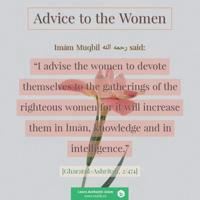It's astonishing how some Muslims wish to belong to a parliament governed by the laws of those whom we are commanded to fight. Thus, there is a stark contrast between this parliamentary system and its participants, if I may use the term, and the Islamic consultative council (Shura). This is the first point.
Secondly, the Shura council is not open to every Muslim; rather, it specifically includes the elite of the nation— infact we may say, it is open to the especially elite of the nation; the scholars and dignitaries.
On the other hand, parliament is inclusive of all and sundry, together with Muslims, polytheists, and atheists. This is because parliament operates through elections where individuals, including men and of late women as well, from both Muslim and non-Muslim backgrounds, can nominate themselves. There is a significant difference between the Islamic Shura council and what is referred to today as parliament.
Even if elections were conducted entirely freely, as they claim, allowing people to freely choose their representatives to address their issues and problems, the matter would be much simpler than it currently is.
So how is it, when in every country, without exception, whether Muslim or non-Muslim, votes are bought and consciences are sold? How can Muslims govern under such elections, which are described in such negative terms?!
That's what can be said based on what I understood from one part of the question. As for the second part, that is, I may say it is a tendency in these times referred to as 'What is the alternative'?
A very simple word, and because of its simplicity, the weak resort to it—the weak among people and those who have strayed from the guidance of the Quran and the Sunnah of the Prophet, peace be upon him ﷺ-.
They want to achieve an alternative overnight. Recently, we had a discussion about banks, more specifically, Islamic banks, and we clarified that there is no difference between these banks that raise the Islamic banner and British or American banks at all because the system is the same. Unfortunately, the bank that declares itself as an Islamic bank may be more dangerous than other banks, whether British or American, because these banks hide behind the guise of Islam. They act like the Jews, those whom the Book and the Sunnah have warned us against following their ways, especially the well-known clear hadīth in al-Bukhārī where the Prophet, peace be upon him ﷺ, said:
لَتَتْبَعُنَّ سَنَنَ مَنْ كَانَ قَبْلَكُمْ شِبْرًا شِبْرًا وَذِرَاعًا بِذِرَاعٍ، حَتَّى لَوْ دَخَلُوا جُحْرَ ضَبٍّ تَبِعْتُمُوهُمْ ". قُلْنَا يَا رَسُولَ اللَّهِ الْيَهُودُ وَالنَّصَارَى قَالَ " فَمَنْ؟
The Prophet ﷺ said, "You will follow the ways of those nations who were before you, span by span and cubit by cubit (i.e., inch by inch) so much so that even if they entered a hole of a lizard, you would follow them." We said, "O Allāh's Messenger ﷺ! (Do you mean) the Jews and the Christians?" He said, "Whom else?"
I said on this occasion, either last night or the night before, I stated that we are often asked in such circumstances about the alternative to these banks, which we condemn for engaging in interest-based transactions forbidden by the Quran and Sunnah. They ask, "What is the alternative?" I said, and I say here, aiming as they say, to hit two birds with one stone. The alternative is in the words of Allāh, the Exalted:
{ وَمَن یَتَّقِ ٱللَّهَ یَجۡعَل لَّهُۥ مَخۡرَجࣰا ¤ وَیَرۡزُقۡهُ مِنۡ حَیۡثُ لَا یَحۡتَسِبُۚ}
And whosoever fears Allâh and keeps his duty to Him, He will make for him a way out. And will provide for him from where he percieves not. [65:2-3]
The alternative is the fear of Allāh, the Mightyand Majestic. Undoubtedly, fearing Allāh requires, first and foremost, beneficial knowledge and, secondly, righteous deeds coupled with this beneficial knowledge.
Neither righteous deeds can suffice without beneficial knowledge, nor can beneficial knowledge suffice without righteous deeds. It is essential to combine both.

